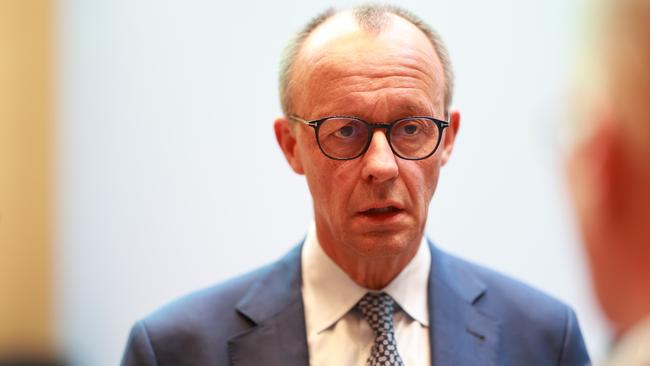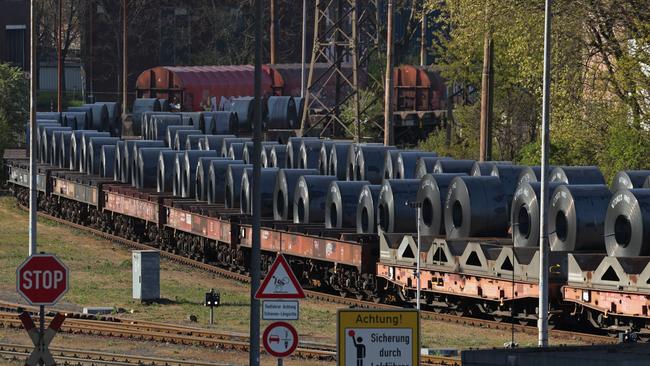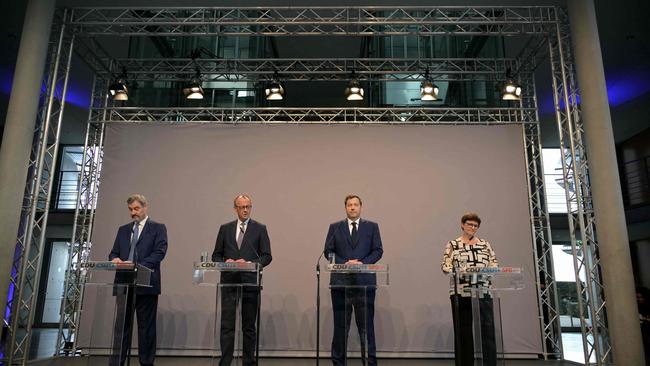Germany’s Merz strikes coalition deal but voter support flocks to AfD
Now Friedrich Merz must persuade Germans – who have been deserting his party in droves – that he can fix the economy and get immigration under control.

Germany’s chancellor-in-waiting has clinched a deal to form a new coalition, officials said on Wednesday. Now he must persuade Germans who have been deserting his party in droves since he won the election that he can fix the economy and get immigration under control.
Even before taking office, Friedrich Merz and his conservative Christian Democratic Union have seen their ratings plummet while the far-right Alternative for Germany, or AfD, became the country’s most popular party, according to a poll released Wednesday.
Like other European leaders, from France’s Emmanuel Macron to the UK’s Keir Starmer, Merz is facing a puzzle: How to implement the disruptive and painful changes required by an increasingly turbulent economic and geopolitical environment without losing voters’ increasingly fragile trust.
The coalition agreement showed that “the political centre in our country is capable of solving the problems we’re facing,” Merz said on Wednesday, as he unveiled the document following weeks of negotiations after the February 23 election.

His government, he said, would lower taxes on businesses and some households, help companies restore their competitiveness, drastically reduce illegal immigration and reclaim Germany’s leadership role in the European Union.
In a nod to frequent demands from the right, Merz said Germany would make it harder for migrants legally in the country to obtain German citizenship and would reduce the size of the federal government payroll by 8 per cent.
The coalition program builds on an initial agreement to deploy a roughly one-trillion-euro defence and infrastructure spending package to rebuild a military hollowed out by decades of neglect and drag Europe’s largest economy out of a two-year recession.
That decision broke with a longstanding German tradition of fiscal restraint and gained plaudits across Europe. Merz then pledged to repair relations with neighbours and stand up to President Trump, feeding a narrative that Germany was back following his predecessor Olaf Scholz’s introverted three-year reign.
So far, however, German voters have shown no such enthusiasm. An Ipsos poll published on Wednesday showed support for the AfD overtaking the CDU’s for the first time, with the AfD’s rating reaching 25 per cent and the CDU’s falling to 24 per cent, down more than four points from its election result.

Merz’s decision to jettison fiscal restraint after pledging to cut spending and abide by the country’s fiscal rules during his campaign caused consternation among conservative voters in particular, prompting the CDU’s youth wing to warn that they may not support Merz’s government.
The U-turn on fiscal policy had fatally undermined trust in Merz, said Manfred Güllner, head of the Forsa polling group. More than a quarter of CDU supporters and 60 per cent of all voters see Merz as unfit to be chancellor, according to a Forsa poll released on Wednesday.
The conservative leader won’t have to face an election for another four years, but his party could suffer at a string of important state ballots in the next two years. A series of defeats could undermine support in the future government and test the coalition’s cohesion.
Plummeting popular support was among the reasons for the collapse of the last German government one year ahead of schedule.
Merz’s task will also be complicated by President Trump’s global trade war.
After the future government unveiled its spending plans, economists predicted that Germany could return to positive growth as early as this year. Business sentiment surveys have improved recently, suggesting that the embattled economy might be turning the corner.
But with the EU facing 20 per cent tariffs, many expect Germany’s export-dependent economy to be hit particularly badly. Michael Holstein, chief economist at DZ Bank, said the economy was now likely to shrink for the third year in a row instead of rebounding by 0.2 per cent as initially planned.
The US was Germany’s largest foreign market last year, accounting for more than 10 per cent of the country’s exports.
Asked what his message to Trump would be, Merz said “the key message … is that Germany is back on track. Germany will fulfil the obligations in terms of defence and Germany is willing to strengthen its own competitiveness,” pointing to a key driver of the country’s past export prowess.
Wednesday’s agreement isn’t the last hurdle before Merz can become chancellor. The SPD will now put the deal to a vote of party members in an online poll that will take place over the next two weeks. Merz’s CDU will adopt the deal at the leadership level.
If the document is approved by both parties, this would put Merz on course to be elected chancellor by parliament in early May.
Wall Street Journal





To join the conversation, please log in. Don't have an account? Register
Join the conversation, you are commenting as Logout